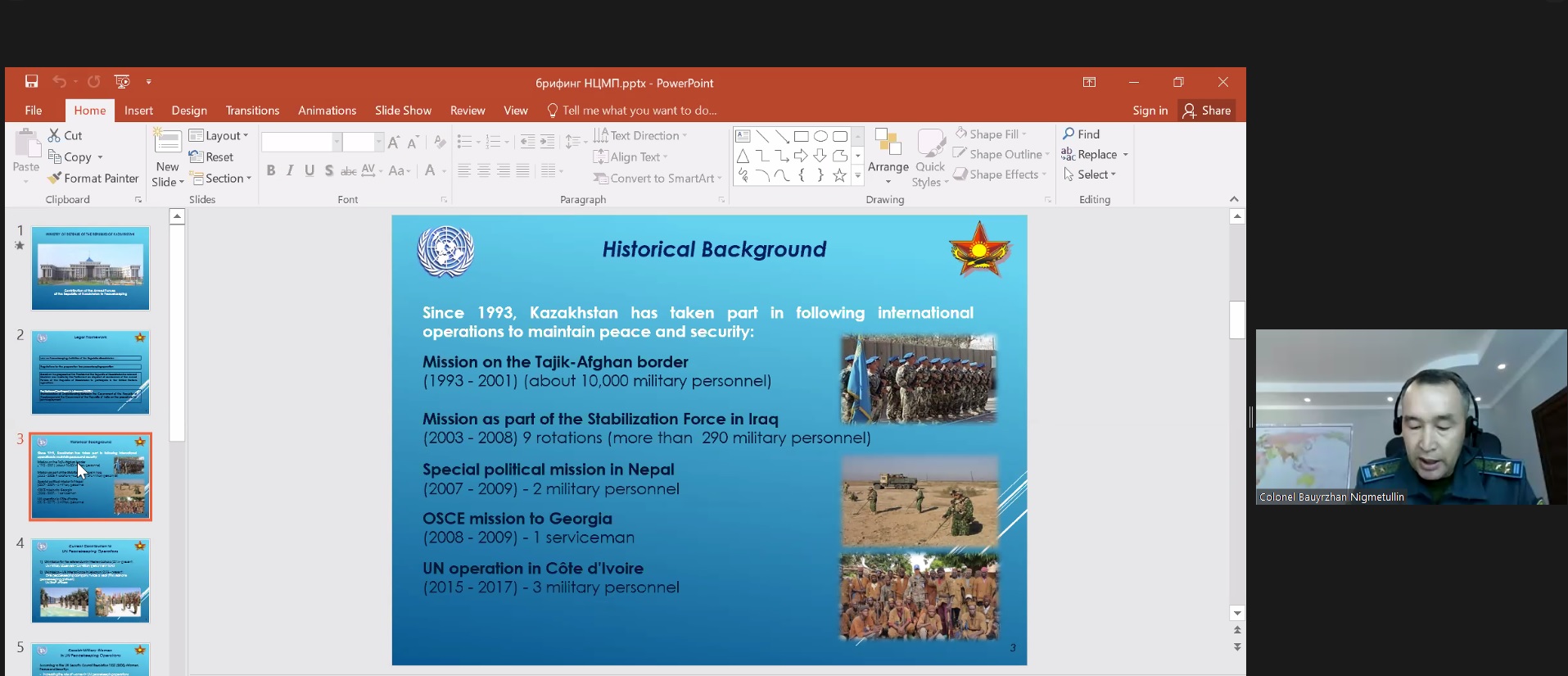London platform discusses Kazakhstan’s military reforms and contribution to peacekeeping

London, June 9, 2021 – Kazakhstan’s military reforms and peacekeeping efforts were the main topic of discussion at a webinar hosted by the Embassy of Kazakhstan in the UK and the British-Kazakh Society to mark the 30th anniversary of Independence of the Republic of Kazakhstan.
Speakers of the event themed ‘Army of the Great Steppe: Kazakhstan’s Military Reform and Peacekeeping Ambition’ included Erlan Idrissov, Ambassador of Kazakhstan to the UK; Lord Astor of Hever; Colonel Bob Stewart MP, Chairman of the All-Party Parliamentary Group for Kazakhstan; Colonel Olzhas Khussainov, Head of the Department of International Cooperation of the Ministry of Defence of the Republic of Kazakhstan; and Colonel Bauyrzhan Nigmetullin, Head of the Peacekeeping Training Centre of Kazakhstan’s Ministry of Defence.
Opening the event, Ambassador Idrissov noted that Kazakh-British defence cooperation has been an important part of the strategic relationship between the two countries.
In this context, Lord Astor stressed that the history of the UK-Kazakhstan military cooperation is extensive and successful, and the exercise Steppe Eagle is its significant component.
“Today, the Kazakh army has modernised and transformed across all areas, including structure, training, and materials. Kazakhstan’s major role in international peacekeeping is much welcomed. And Kazakhstan is one of the largest peacekeeping forces to have emerged from the former Soviet Union,” he said.
Colonel Stewart noted the importance of Kazakhstan’s support for United Nations peacekeeping operations, including participation in missions in Lebanon, Eastern Sahara, and Iraq. He also expressed hope for Kazakh-British joint participation in peacekeeping missions under the UN auspices.
Colonel Khussainov briefed the audience about the main stages of modernisation of Kazakhstan’s Armed Forces since Independence. Kazakhstan has experienced a major transformation over the years – from the owner of the world’s fourth nuclear arsenal to a global non-proliferation leader and an active participant in joint peacekeeping efforts.
Colonel Nigmetullin spoke in detail about Kazakhstan’s contribution to peacekeeping missions under the UN auspices and measures taken by the Kazakh military and political leadership to expand the geography of participation in peacekeeping activities.
Since 1993, Kazakhstan has participated in international operations on the Tajik-Afghan border, in Iraq, Nepal, Georgia, Ivory Coast, Eastern Sahara and Lebanon.
“As required by the UN, Kazakhstan takes consistent measures to reach gender equality in peacekeeping. Four female officers from Kazakhstan have already participated in UN peacekeeping operations and one is currently deployed in Western Sahara. The fact that two female peacekeepers are currently serving as instructors at Peacekeeping Training Centre shows how important the issue is for us,” he stressed.
He also highlighted that with the assistance of the British side, a number of measures are currently being taken to increase the language skills of Kazakh military personnel within the ‘English for Peacekeepers’ project. Those include language training for peacekeeping personnel and specialised language training for instructors of the Peacekeeping Training Centre.
The UK participants of the event praised Kazakhstan’s role in strengthening peace and stability across the world and expressed readiness to enhance defence cooperation, including through joint participation in peacekeeping operations, training, and experience exchange.
The presentations were followed by a Q&A session where the audience received detailed answers to their questions.
The webinar is the fifth in a series of ‘Kazakhstan at 30’ events dedicated to the 30th anniversary of Kazakhstan’s Independence, organised by the Embassy on the British-Kazakh Society platform.